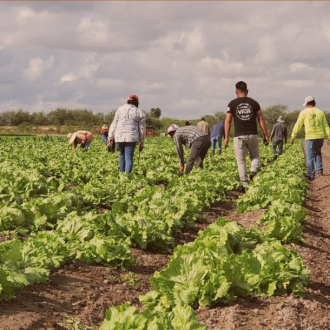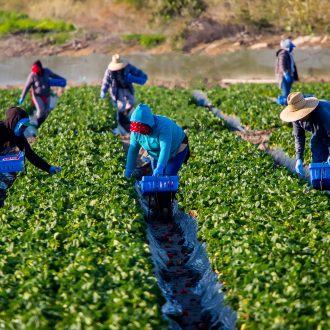This should be read before the walking meditation, and can be read by being passed from one participant to the next. Facilitator can choose to use 1-2 of the reflection questions or none at all.
Blessed are those who hunger and thirst after righteousness, for they shall be filled.
In this Beatitude, Jesus speaks to his disciples regarding righteousness in the most elemental terms possible. There are no physical sensations more primal than hunger and thirst. If a person is in dire thirst there is nothing she will not try in order to satisfy her craving. The reason for this is simple: without water a person will die. Hunger and thirst are regular parts of our lives, and they are instincts that save us from death. It is with this powerful language of hunger and thirst that Jesus confronts his listeners in the Sermon on the Mount.
 In the original text there is a definite article before the word “righteousness.” This article is often not expressed in our English translations. A more accurate translation might read, “Blessed are those who hunger and thirst after the righteousness, for they shall be filled.” What does this mean? What is Jesus trying to communicate here? It seems that Jesus is confronting popular conceptions of righteousness, and promoting a specific type of righteousness. The righteousness that Jesus promotes is not an abstract righteousness, or dusty legality, but a deep and abiding righteousness that bears witness to the kingdom of heaven on earth, a truly new kingdom defined by forgiveness, peace, and hospitality. The righteousness that Jesus refers to in this Beatitude is the kingdom ethic promoted on the Sermon on the Mount. How are humans supposed to respond to this new ethic, this specific righteousness? We are supposed to desire it as we desire food. It is to be such a priority to us that we sense that we would starve without it.
In the original text there is a definite article before the word “righteousness.” This article is often not expressed in our English translations. A more accurate translation might read, “Blessed are those who hunger and thirst after the righteousness, for they shall be filled.” What does this mean? What is Jesus trying to communicate here? It seems that Jesus is confronting popular conceptions of righteousness, and promoting a specific type of righteousness. The righteousness that Jesus promotes is not an abstract righteousness, or dusty legality, but a deep and abiding righteousness that bears witness to the kingdom of heaven on earth, a truly new kingdom defined by forgiveness, peace, and hospitality. The righteousness that Jesus refers to in this Beatitude is the kingdom ethic promoted on the Sermon on the Mount. How are humans supposed to respond to this new ethic, this specific righteousness? We are supposed to desire it as we desire food. It is to be such a priority to us that we sense that we would starve without it.
*****
In “The Long, Hot Summer of 1967,” brooding political and social tensions erupted into violence across the U.S. Radical political rhetoric increasingly evoked violent imagery. Riots broke out in Detroit and Newark, and violence loomed over the fields of California. The popular vision of violent and rapid social change seduced some of the striking farm workers in César Chávez’s movement. They had grown tired of participating patiently in the non-violent struggle for justice. They began to carry weapons, threaten scabs with beatings, and commit acts of sabotage on police cars and farm machinery. César grieved this violent spirit and rebuked the strikers saying, “You reap what you sow; if we become violent with others, then we will become violent among ourselves. Social justice for the dignity of man cannot be won at the price of human life.” Despite his words, the longing for violence among the disgruntled farm workers only seemed to increase. Early in 1968 large scale violence seemed unavoidable. Cesar then began another form of rebuke, one that reveals profoundly what it means to hunger and thirst for righteousness.
César’s non-violence was inspired by his Catholicism. Additionally, he had seen non-violence work in the Martin Luther King Jr.’s struggle in the South. César understood that non-violence is truthful because it reveals Christ’s righteousness. For this reason, César understood the emerging militant tendencies of some members of the United Farm Workers union to be a move toward unrighteousness. Thus, as the leader of the farm worker movement, César announced that he would refuse food “until such a time as everyone ignored” him or “made up their minds that they were going to be committing to non-violence.” César announced his fast on February 18th, and told those near him that he had already been fasting for 4 days.
Day after day César lay in a bed declining food until the members of his  union convinced him that they were committed to the righteousness of non-violence. This fast became a defining moment for the farm worker movement. As César lay in bed, farm workers from all over California gathered around his quarters. The farm workers pitched tents near César’s house, creating a community. They began to share food among themselves and pray together. César’s fast was inaugurating a spiritual revival among the farm workers. On March 11th, the twenty-five day fast ended with a Mass, attended by 8,000 people. He broke bread with his mother and Senator Robert Kennedy. He began to fill his stomach again, because his hunger for righteousness was also being filled. After the liturgy, a statement written by César was read over the loud speakers. In the statement César wrote:
union convinced him that they were committed to the righteousness of non-violence. This fast became a defining moment for the farm worker movement. As César lay in bed, farm workers from all over California gathered around his quarters. The farm workers pitched tents near César’s house, creating a community. They began to share food among themselves and pray together. César’s fast was inaugurating a spiritual revival among the farm workers. On March 11th, the twenty-five day fast ended with a Mass, attended by 8,000 people. He broke bread with his mother and Senator Robert Kennedy. He began to fill his stomach again, because his hunger for righteousness was also being filled. After the liturgy, a statement written by César was read over the loud speakers. In the statement César wrote:
“The Fast was first for me and then for all of us in this Union. It was a fast for non-violence and a call to sacrifice. Our struggle is not easy. Those who oppose our cause are rich and powerful and they have many allies in high places. We are poor. Our allies are few. But we have something the rich do not own. We have our bodies and our spirits and the justice of our cause as our weapons. “It is my deepest belief that only by giving our lives do we find life. I am convinced that the truest act of courage, the strongest act…is to sacrifice ourselves for others in a totally non-violent struggle for justice. God help us…”
César’s fast in the winter of 1968 provides a dramatic example of what it means to hunger and thirst for righteousness. While Jesus may have been speaking metaphorically, César’s fast is a literal embodiment of experiencing hunger for the sake of righteousness. The righteousness of non-violence was so important to César that he expressed his longing for it through becoming physically hungry. His desire for the righteousness, both his own and that of the farm worker movement, are inspirational to farm worker advocates today.
Reflection Questions:
- When were you most physically hungry in your life? Describe what it felt like. How does that experience influence how you understand this Beatitude?
- How do you think that César’s faith helped sustain him during struggles that he saw in his 31 years of work with farm workers?
- Why do you think that people are so quickly satisfied with their own righteousness? What do you think is at the root at the root of spiritual complacence?
- Reflect on the statement that César had read after he broke his fast. How is it related to the Sermon on the Mount?
- Do you think that Jesus was speaking metaphorically or literally when he said, “Blessed are those who hunger and thirst for righteousness for they shall be filled?”
- Do you think César’s hunger for righteousness was filled?
page 13-16 of Witnesses to the Kingdom: The Beatitudes Embodied by Matthew Smalley. National Farm Worker Ministry 2005.



